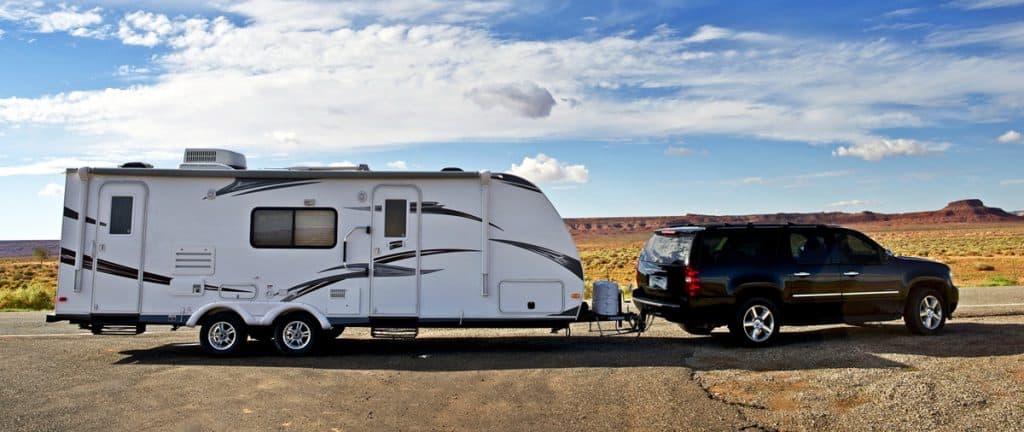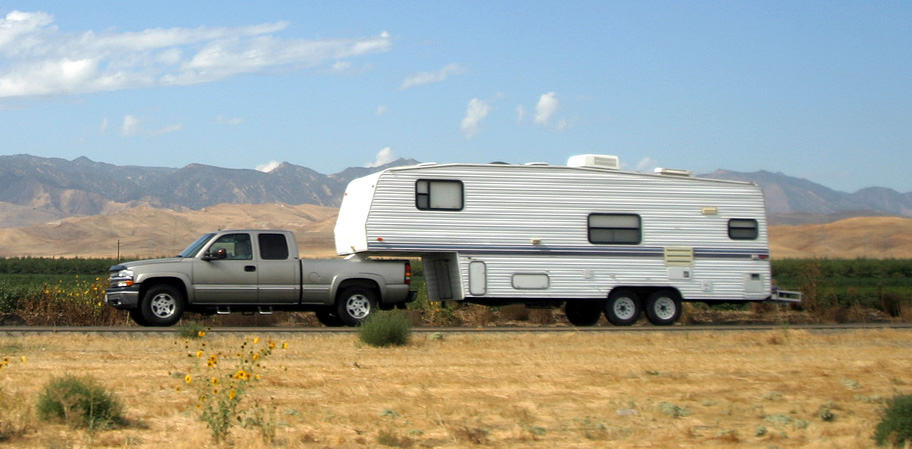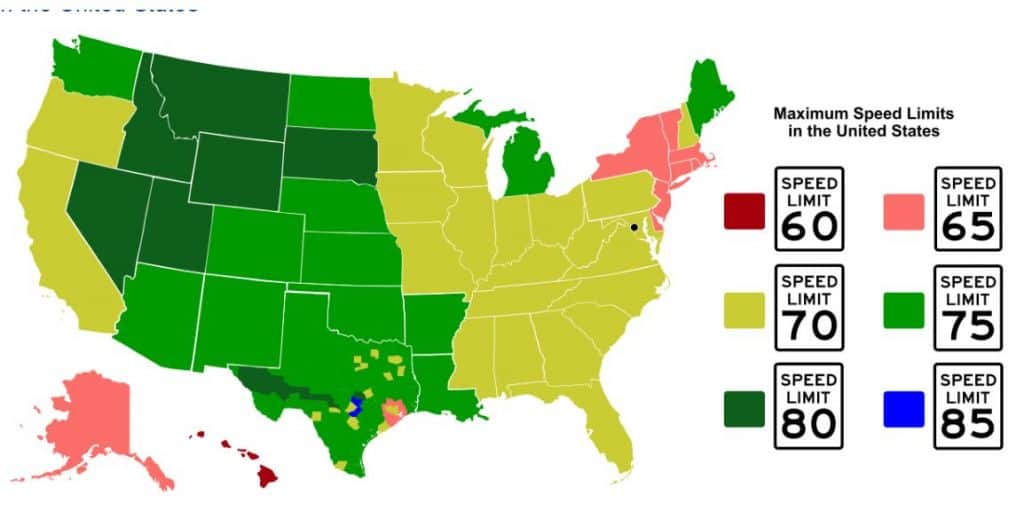what is the best speed to drive a motorhome
Disclosure: We may become commissions for purchases made through links in this post.
Planning an RV vacation and trying to calculate driving times? Wondering how fast you tin go when towing a travel trailer or 5th bicycle?
Driving a large vehicle will slow you down. Towing will slow yous down fifty-fifty more.
The fastest you should exist going at whatsoever point is probably 55 MPH - and even that may be too fast. To stay on the safe site, estimate 45 MPH for your trip.
Here's why.
Every bit a rule of thumb, driving or towing whatever large RV subjects you lot to the driving speed limits of commercial trucks. In most states, that means you should not get faster than 55MPH.
Even so, commercial truck drivers are far more knowledgeable than most RVers when it comes to pulling and towing. In any towing setup - especially when towing a travel trailer or camper, you must slow down even more to prevent sway.
Proceed reading to find out more than on when slowing down is crucial. The information in this mail service could very well relieve your life someday.
The RV Towing Setup
Virtually often, you'll see two types of trailers towed behind a pickup truck or full-size SUV:travel trailers or fifth-bike trailers.
Travel trailers are the lighter of the two. They go behind your towing vehicle, exist that a pickup truck or an SUV.

Fifth-wheels are ordinarily heavier and bulkier than travel trailers. They are towed by pickup trucks with the front end function of the 5th wheel hitched on top of the truck -

The towing method matters for your speed
Every bit a rule of thumb - towing 5th wheels is easier. The way in which the 5th cycle "sits" on top of the bed of a truck makes the entire setup far more stable.
With travel trailers, yous only accept that narrow hitch connecting two large and heavy masses. That's a lot for that hitch to handle properly. Which makes travel trailers far more susceptible to the bane of all RV towing: Sway.
Nosotros'll talk more than about sway in a moment. For at present, nosotros merely wanted to explain why it actually matters whether you tow a 5th cycle or a travel trailer.
How Fast Can Yous Drive An RV?
Putting sway issues and even towing issues aside for a moment - brings us to the question:
How fast can you drive the more stable version of an RV aka the motorhome?
What should be your speed limit - regardless of towing issues?
Even though you're driving a significantly large vehicle, yous however demand to obey the rules of the road. Yous should drive inside the speed limit. Generally speaking, it'south safety to assume you're in the same class as a full-size truck or bus. So, that sign with speed limit for trucks? That one is for you.
And speed limits modify according to the route you're on and the country/county y'all're in. Nosotros plant this absurd image on Wikipedia -

Clearly some states are "faster" than others! And Texas is just all over the place depending on which canton you're in.
Once again, these are the speed limits for regular vehicles - without towing. The speed limit for trucks is generally between 5 and 10 MPH less.
If you're towing, information technology may be worth checking the law of u.s. you program on going through. Some of them have special limitations on towing which may include specific speed limits.
Weather in Which You Should Drive More Slowly
While obeying speed limits is an integral office of being a safe commuter, there are some atmospheric condition in which you should irksome down even more. These include:
- Making turns: Whether it'due south a sharper, more sudden plough or one that'south wider, reducing speed volition help your vehicle safely navigate without chance of tipping.
- Driving in the dark: Adjusting to driving a motorhome or towing a trailer in the dark brings with it its ain unique set of challenges. No affair what kind of driving you're doing, y'all might want to take it more slowly at kickoff. Once you lot're more familiar with nighttime driving, you can motion at somewhat faster speeds.
- Windy conditions: Driving against the wind is one way to potentially tip over your motorhome or trailer (more on this shortly). Work with the wind and cut back your average speed by a few MPH.
- Poor route conditions: There are many situations that constitute poor road conditions. It could be raining, snowing, or foggy. At that place could be construction going on around you. The route could suddenly turn to dirt or another uneven surface. In these conditions, yous must have it easy. Rushing through could lead to an accident.
- Lack of experience: If you're notwithstanding not totally comfy with your driving setup, that's okay. You will suit and familiarize yourself with time. Until y'all get there, you lot tin can drive more than slowly. Just don't movement at such a snail'south step that you put other motorists at risk.
More than Reasons to Go Slowly
These are true for whatever vehicle only even more so for a heavy RV setup, here are some other reasons to stay conscientious of your speed:
- More impairment is likely in the event of an accident: No ane ever wants to make it an accident, but they happen every single mean solar day. The faster you're driving in a automobile, the more damage yous crusade. Now retrieve of what would happen if you're behind the bike of a motorhome. Yous could magnify the average impairment from an accident by tenfold.
- Yous wear down the tires faster: Replacing machine tires may exist a hurting, simply changing out motorhome tires is an ordeal. Why do it more oft than you have to? The faster and harder you drive, the more wearable and tear you put on the tires and the rest of the rig.
- Your breaking time is not as fast as you're used to: You lot cannot wait to slam on the brakes and come to a stop in seconds when driving a motorhome. It will never happen. You must exist aware of your surroundings at all times so yous tin can plan when to utilise the brakes if need exist. This all goes back to preventing and fugitive accidents.
Understanding Sway
The faster you go when towing, the less stable your setup becomes. You could and so experience what'southward known as trailer sway . This is when your trailer moves independently of your pickup truck or SUV. It fishtails, veering into the side by side lane. The trailer can easily collide with metal railings or other vehicles on the road.
What causes trailer sway? These are the chief reasons it happens:
Y'all didn't bother to check the weight distribution of your trailer earlier y'all left. If the weight is excessive in one corner of the trailer, that surface area could spin out and sway.
Heavy, strong winds are some other contributing factor. These winds don't have to exist weather-related, either. Human being-made winds like drafts from fast-driving motorists can also leave your trailer swaying.
Tiresome down to reduce the hazard of sway
Everything we discussed so far applied to all RVs - motorhomes and towing setups.
Now we come to sway.
To a great extent - sway is a towing issue. And it'south more of an outcome with travel trailers than 5th wheels.
Swaying is when that trailer yous're towing backside you gets a life of its own and begins to move from side to side, substantially pulling the towing vehicle along with it. This is what it looks similar -
What happens is that the towing vehicle loses command over the trailer. As the trailer sways to one side, the driver tries to "correct" the pull by pulling in the other management. That merely makes things worse.
A professional person full-size trailer truck driver knows how to deal with sway should information technology happen. Those of us who are not professional truck drivers, usually don't. Drivers tend to make things worse, to the point of the trailer tipping over and taking the towing vehicle downwardly with information technology.
The solution is to forbid sway from the first. Be certain to check out our in-depth guide to preventing trailer sway for a more comprehensive overview of trailer sway and how to forestall it. For at present, nosotros'll comprehend the most important data equally it pertains to this postal service.
In the context of this post, the thing you lot have to do is drive more than slowly.
At all times, meaning even when you're trying to take over another vehicle. If taking over means you lot have to speed to the point where you could lose control over the travel trailer - then don't.
Here are some boosted tactics to endeavor and avoid trailer sway:
Tow the trailer with the right truck -
Lucifer the pickup truck or the other towing vehicle to the weight and size of your towable. Remember that the height, width and generally length of your trailer all cistron in. Yes, towing chapters is a number that relates to the weight of the trailer. But length matters too. If towing a very lengthy trailer, you should exercise that with a stronger truck than you would for a shorter trailer of the same length.
Tow under your towing limits -
The heavier the load - the higher the risk for sway. Never go above your towing capacity. To stay on the prophylactic side - go along some "cushioning" and go nether the towing capacity by ten% or then.
Use a weight distribution hitch -
These are recommended by the National Highway Traffic Rubber Administration (NHTSA). They keep the weight distribution even, which can forestall trailer sway from happening. Nosotros talked nigh weight distribution hitches above.
Redistribute weight -
If your cargo, gear, and other equipment are all piled to one side of the trailer, change that. Besides, avoid placing almost of the weight in the rear of your trailer. The closer the weight is to the hitch, the better. Hither'south a fantastic brusk video that demonstrates this point -
Avoid traveling in high winds
Strong winds, especially crosswinds, tin can spell doom for your trailer. A crosswind that's 35 miles per hour is enough to take chances tipping your trailer. Bank check the forecast and avoid windy days.
Think - these things add up - speed included
The factors contributing to the risk of sway add upward. To recap, the following elements increase the risk of sway -
- Heavy weights
- Weight distribution issues
- Length of trailer
- Type of hitch
- Wind
- Speed
Speed is the one thing that's easiest to command from ane moment to the adjacent. So, the higher the load - and the less well-counterbalanced - the slower you should go.
Windy conditions? Irksome down. Don't look for sway to begin - just slow downwards gradually and gently (don't hit the brakes!) to avoid sway.
And if y'all're really worried about sway - consider switching to a 5th wheel or motorhome.
Passing Other Motorists and Irresolute Lanes
On the note of trailer sway and even motorhome swaying (because yes, it can happen to all kinds of RVs), you have to exist a kind, patient commuter. If you're the type who would always laissez passer cars to alter lanes while on a major highway, you're going to have to alter your ways.
Performing those maneuvers can exist as well risky for a trailer or motorhome. You lot'd have to speed up significantly to pull information technology off. You're also switching lanes at the aforementioned time. Both the direction change and the speed boost can threaten your vehicle'due south stability. You could shortly find yourself swaying or tipping.
It's recommended that you only change lanes if at least 2 of the lanes are going in the same direction, with no sudden exits or off ramps alee. Yous should be at a speed close to the other motorist so you don't have to crank the accelerator to gain more speed.
Drive slow - and drive safely!
Source: https://vehq.com/rv-towing-driving-speed/
0 Response to "what is the best speed to drive a motorhome"
Post a Comment